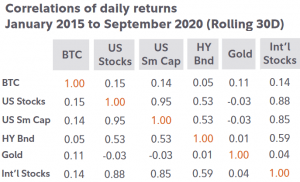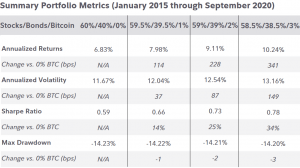Institutionals Might Make Bitcoin More Exposed To Economic Headwinds
While bitcoin (BTC), as an investment, is still attractive because it is an independent, alternative, and uncorrelated asset, a growing institutional investor base could increase bitcoin’s correlation with other traditional assets, according to Fidelity Digital Assets (FDA), a crypto arm of US-based mutual fund giant Fidelity.

As BTC is becoming increasingly integrated into institutional portfolios, it could become more and more correlated with other assets, and external events might have a growing impact on bitcoin, “especially if bitcoin’s narrative converges on a single use case”, Ria Bhutoria, Director of Research at FDA, said in a recent report, named Bitcoin Investment Thesis.
“In other words, if bitcoin becomes more correlated with certain assets in light of this potential trend, its portfolio diversification benefits relative to certain assets could decline,” Bhutoria said.
As for now, due to its multifaceted narratives and persisting retail and growing institutional sentiment, “bitcoin is fundamentally less exposed to the prolonged economic headwinds” that are threatening other assets. As such, it “could be a potentially useful and uncorrelated addition to an investors’ portfolio toolkit,” the researcher said.
According to her, there are four reasons why bitcoin has exhibited low correlation in the past, namely:
- Different return and risk factors such as the momentum effect, proxies for negative investor attention, speculation and sentiment-driven trading activity, and resilience to the supply and demand shocks in the traditional markets.
- Evolving narratives. Bitcoin has various dynamic narratives of what people expect it to be and to do.
- Greater overlap between market participants. Until recently, bitcoin was untethered to traditional markets.
- Retail driven phenomenon. Bitcoin is unusual in that it first had favor with retail investors rather than institutional players.

The report comes in the light of recent news that Fidelity plans to start its first Bitcoin fund.
Meanwhile, Chamath Palihapitiya, CEO of venture capital firm Social Capital, Chairman of commercial spaceline Virgin Galactic, recently argued that BTC can’t be correlated to traditional assets because it’s the opposite of today’s financial infrastructure.
Benefits and considerations
Unlike conventional alternative investments used for portfolio diversification effects, bitcoin also comes with benefits like liquidity, accessibility, and low fees.
According to the report, bitcoin is relatively easy and inexpensive to enter and exit, as it trades 24/7 with a substantial daily trading volume. Besides, it is significantly more accessible as it “democratizes access” to investing.
“Bitcoin itself does not discriminate based on investor profile or geography, and it has been open, public, and accessible by anyone with a cell phone or computer and internet connection from day one.”
FDA also showed how annualized returns of 60/40 portfolios with bitcoin allocation outperformed a 60/40 portfolio with no allocation to bitcoin.

However, the report emphasizes the following considerations for future investments.
- First, bitcoin’s historical performance may have been a consequence of its early-stage behavior, and its performance going forward may be more steady and gradual.
- Second, the analysis is based on historical results and may not necessarily indicate future results.
- Lastly, bitcoin’s volatility may require an active rebalancing strategy with target allocations on a more frequent basis.
In spite of that, the report acknowledged bitcoin’s ability to mature into a fully-fledged independent asset class. And while “bitcoin simply does not fit into defined asset categories,” it is still a legit alternative for institutional investors looking for alternative investments in a portfolio.
Meanwhile, many in the Cryptoverse took Fidelity’s hypothetical example as a recommendation for considering a 5% allocation in bitcoin. In either case, recent reports show that institutional investors seem to be more interested in this alternative asset.
US-based investment company Stone Ridge Holdings Group recently revealed that it owns BTC 10,000, while Jack Dorsey’s Square said last week that it acquired USD 50m worth of BTC, after MicroStrategy, an American software company, used its balance sheet to buy over USD 400m worth of BTC.
At pixel time (12:32 UTC), BTC trades at USD 11,412 and is down by less than 1% in a day, trimming its weekly gains to 7%. The price is up by 9% in a month and 37% in a year.
___
Learn more:
Brace For Higher Bitcoin Volatility and Returns in October – Kraken
4 Reasons Bitcoin May Hit USD 1-5 Trillion Market Cap in 10 Years
Brace For More Bitcoin Flash Crashes In This Bull Market – Hut 8 Founder
This Generalist Investor Goes Long on Bitcoin, Says USD 40K-100K Possible




